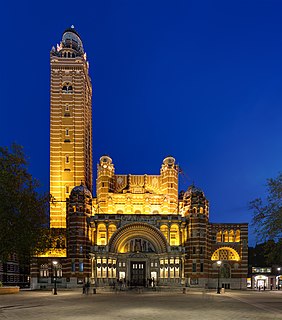
Anglicanism is a Western Christian tradition which has developed from the practices, liturgy, and identity of the Church of England following the English Reformation.
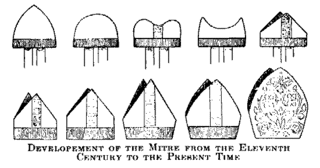
An episcopal polity is a hierarchical form of church governance in which the chief local authorities are called bishops. It is the structure used by many of the major Christian Churches and denominations, such as the Roman Catholic, Eastern Orthodox, Oriental Orthodox, Church of the East, Anglican, and Lutheran churches or denominations, and other churches founded independently from these lineages.

In the Christian churches, holy orders are ordained ministries such as bishop, priest, or deacon, and the sacrament or rite by which candidates are ordained to those orders. Churches recognizing these orders include the Catholic Church, the Eastern Orthodox, Oriental Orthodox, Anglican, Assyrian, Old Catholic, Independent Catholic and some Lutheran churches. Except for Lutherans and some Anglicans, these churches regard ordination as a sacrament. The Anglo-Catholic tradition within Anglicanism identifies more with the Roman Catholic position about the sacramental nature of ordination.

Ultramontanism is a clerical political conception within the Catholic Church that places strong emphasis on the prerogatives and powers of the Pope.

Mass is the main eucharistic liturgical service in many forms of Western Christianity. The term Mass is commonly used in the Roman Catholic and Anglican churches, as well as in some Lutheran, Methodist, Western Rite Orthodox, and Old Catholic churches.
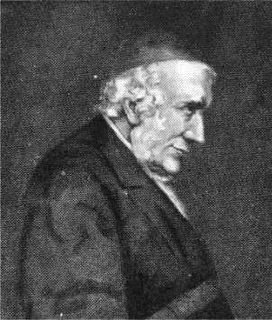
The Oxford Movement was a movement of High Church members of the Church of England which eventually developed into Anglo-Catholicism. The movement, whose original devotees were mostly associated with the University of Oxford, argued for the reinstatement of some older Christian traditions of faith and their inclusion into Anglican liturgy and theology. They thought of Anglicanism as one of three branches of the One, Holy, catholic, and Apostolic Church.

The term "high church" refers to beliefs and practices of ecclesiology, liturgy, and theology, generally with an emphasis on formality and resistance to "modernisation". Although used in connection with various Christian traditions, the term originated in and has been principally associated with the Anglican/Episcopal tradition, where it describes Anglican churches using a number of ritual practices associated in the popular mind with Roman Catholicism. The opposite is low church. Contemporary media discussing Anglican churches tend to prefer evangelical to "low church", and Anglo-Catholic to "high church", though the terms do not exactly correspond. Other contemporary denominations that contain high church wings include some Lutheran, Presbyterian, and Methodist churches.

The Anglican Use is an officially approved form of liturgy used by former members of the Anglican Communion who joined the Catholic Church while wishing to maintain the treasures of the Anglican tradition.
Graham Douglas Leonard KCVO was an English Roman Catholic priest and former Anglican bishop. His principal ministry was as a bishop of the Church of England but, after his retirement as the Bishop of London, he became a Roman Catholic, becoming the most senior Anglican cleric to do so since the English Reformation. He was conditionally ordained to the priesthood in the Roman Catholic Church and was later appointed a monsignor by Pope John Paul II.
The Anglican–Roman Catholic International Commission (ARCIC) is an organization created in 1969 which seeks to make ecumenical progress between the Roman Catholic Church and the Anglican Communion. The sponsors are the Anglican Consultative Council and the Pontifical Council for Promoting Christian Unity.
Apostolicae curae is the title of a papal bull, issued in 1896 by Pope Leo XIII, declaring all Anglican ordinations to be "absolutely null and utterly void". The Archbishops of Canterbury and York of the Church of England responded to the papal charges with the encyclical Saepius officio in 1897.
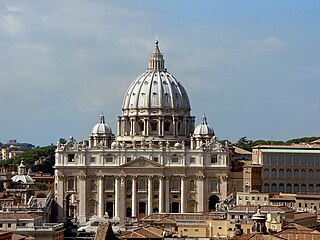
Latin liturgical rites, or Western liturgical rites, are Catholic liturgical rites employed by the Latin Church, the largest particular church sui iuris of the Roman Catholic Church, that originated in Europe where the Latin language once dominated. Its language is now known as Ecclesiastical Latin. The most used rite is the Roman Rite.
Catholicity is a concept pertaining to beliefs and practices widely accepted across numerous Christian denominations, most notably those that describe themselves as Catholic in accordance with the Four Marks of the Church, as expressed in the Nicene Creed of the First Council of Constantinople in 381: "[I believe] in one, holy, catholic, and apostolic Church."
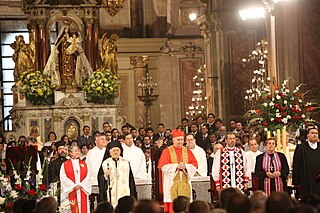
The Catholic Church has engaged in the modern ecumenical movement especially since the Second Vatican Council (1962-1965) and the issuing of the decree Unitatis redintegratio and the declaration Dignitatis humanae. It was at the Council that the Pontifical Council for Promoting Christian Unity was created. Before that time, those outside of the Catholic Church were categorised as heretics or schismatics.
An ordinance or ecclesiastical ordinance is a type of law, legal instrument, or by-law in the canon law of the Catholic Church, the Anglican Communion, and in Calvinism.

A pro-cathedral is a parish church that is temporarily serving as the cathedral or co-cathedral of a diocese or has the same function in a Catholic missionary jurisdiction that is not yet entitled to a proper cathedral, such as an apostolic prefecture or apostolic administration. It is distinct from a proto-cathedral, the term in the Roman Catholic Church for a former cathedral, which typically results from moving an episcopal see to another cathedral, in the same or another city. In a broader context, the term 'proto-cathedral' may be used of a church used by a bishop before a settled cathedral has been designated.

The Personal Ordinariate of Our Lady of Walsingham in England and Wales is a personal ordinariate of the Roman Catholic Church immediately subject to the Holy See within the territory of the Catholic Bishops' Conference of England and Wales, of which its ordinary is a member, and encompassing Scotland also. It was established on 15 January 2011 for groups of former Anglicans in England and Wales in accordance with the apostolic constitution Anglicanorum coetibus of Pope Benedict XVI.

